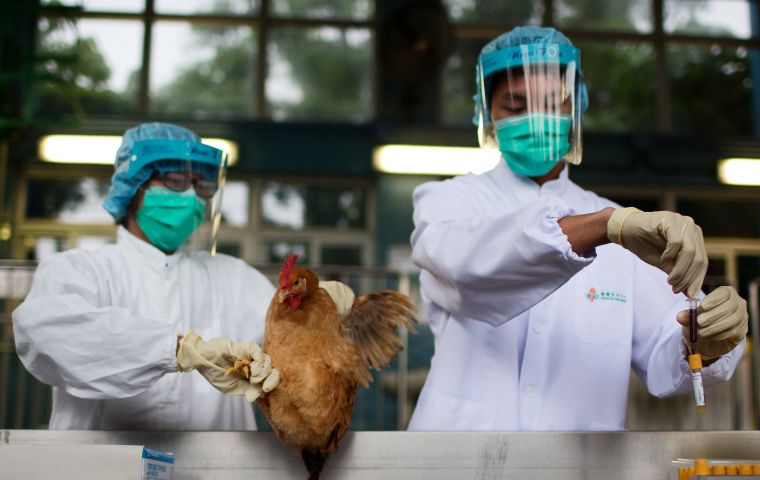MercoPress. South Atlantic News Agency
WHO concerned bird flu virus might affect humans more easily
 The first lineage of the bird flu virus was identified in 1996 and has since caused several infectious outbreaks among birds
The first lineage of the bird flu virus was identified in 1996 and has since caused several infectious outbreaks among birds The World Health Organization (WHO) Wednesday said it has “strong concerns” that the avian flu virus (H5N1) might mutate to infect humans, as outbreaks of the disease among birds are becoming more frequent. In the WHO's assessment, the virus might adapt to infect humans more easily.
”In addition, some mammals may serve as containers in which (different) influenza viruses can mix, leading to the emergence of new viruses that may be more harmful to animals and people,” said the UN Food and Agriculture Agency (FAO) and the World Organization for Animal Health. They called on all countries to work together to protect human and animal populations.
The first lineage of the H5N1 avian influenza virus was identified in 1996 and has since caused several infectious outbreaks among birds. In 2020, a variant of the virus caused a significant number of deaths among poultry and wild birds in Africa, Asia, and Europe, and then spread to North, Central, and South America.
A total of 67 countries on five continents reported cases in 2022, with 131 million domestic birds dying, either from the disease or because they had to be culled.
In recent months, two vaccines were tested in France and proved “very effective” in protecting mulard ducks, bred to manufacture the food product foie-gras.
The “favorable results provide sufficient guarantees to launch a vaccination campaign starting in the autumn of 2023,” said the Ministry of Agriculture on its website.
With the vaccination, “very little virus excretion was observed in the inoculated animals,” explained Béatrice Grasland, of France's health agency Anses. The two vaccines had “very similar” results and “almost stopped direct transmission” and “suppressed” indirect transmission by air, she said, describing the method as “very effective.”




Top Comments
Disclaimer & comment rulesCommenting for this story is now closed.
If you have a Facebook account, become a fan and comment on our Facebook Page!